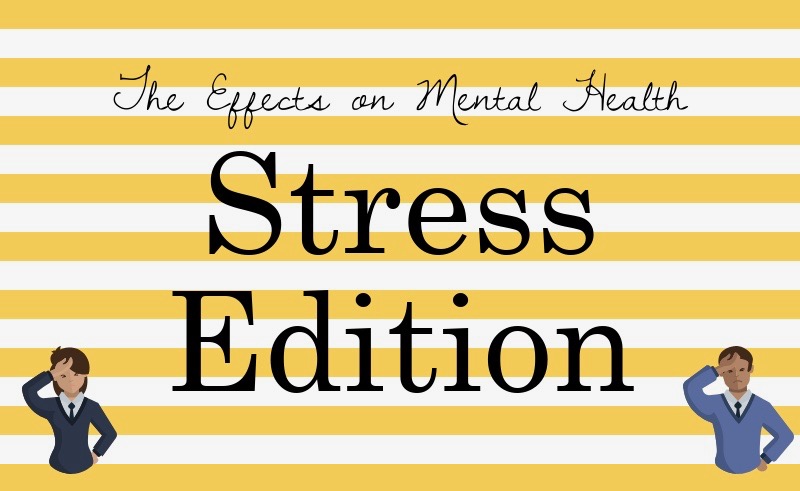The Effects of Stress on Mental Health
September 25, 2018
(Photo Credit: Alley Pauley/ Achona Online/Piktochart)
According to the National Institute for Mental Health, stress not only affects mental health, but also physical health.
While some may believe stress only affects some of the population, everyone experiences stress from time to time. The cause of stress is commonly known as a “stressor,” which a person can experience one time, or it can continuously affect a person over a longer period.
Stress can range from a very small amount to an amount so large and consistent that the sufferer does not realize they are undergoing stress. There are three different types of stress that people can experience every day.

Many Academy students experience acute stress due to homework, tests, and projects.
Robin-Sailor Zander (‘19) says, “I believe I experience extreme acute stress because I am stressed out a lot during school. Right before a hard test, I am a complete mess. Also, deciding which college I am going to and the whole application process is a constant stressor in my life.”
Contrary to popular belief, not all stress is bad. When put under pressure, people tend to be more motivated to prepare better. For example, when studying for a test, students are more motivated to prepare the night before than they would be a week in advance.
Alondra Quinones (‘19) says, “I study a lot more the night before than I would a week before the test. I feel that I am better able to retain information the night before. If I studied a couple days in advance, I would forget everything.”
While a small amount of stress can be helpful in situations such as studying or preparing a project, a large amount of stress over a duration of time can be mentally harmful.
If stress continues over a long period of time without being resolved, it can evolve into chronic stress. Chronic stress is the most harmful type of stress because most people do not even realize they are experiencing stress since they have become accustomed to the symptoms.
When enduring consistent stress, mental health can be deeply affected. For example, depression and anxiety can be traced back to a routine stresser in someone’s life. These mental illnesses can further affect a person and cause problems later in life such as not being able to hold down a job or create meaningful and deeper relationships with others.
Not only does chronic stress play a role in the mental health of a person, but it can also affect the physical aspects and performance of the human body. This can include significant health issues ranging from heart malfunctions to diabetes and even an irregular digestive track. The immune system can also be weakened, allowing the sufferer to become more susceptible to common illness such as the flu or a cold.
Grace Odmark (‘22) said, “I’m overwhelmed by all the changes. I never have experienced this amount of stress because middle school was nothing compared to all the homework and upcoming tests I have.”
All types of stress have the ability to affect sleeping patterns. If a person is experiencing stress for an upcoming assignment or meeting, it is common for them to experience a mild form of insomnia. Insomnia is an abnormal condition that causes the inability to fall asleep, even when attempting to.

Ella Jurusz (’19) says, “My mom says I am the most stressed person she has ever met. I get super stressed right before I am about to perform on stage.”
Savannah Armentrout (‘22) says, “I feel very stressed out because of school, and that causes me to lose a lot of sleep. I stay up until about three worrying about upcoming tests and assignments. I lay in bed for hours trying to fall asleep, but my mind is still racing thinking about what’s going to happen at school the next day.”
Recent studies from the American Psychological Association show teenagers in high school experience a high level of stress compared to a middle-aged adult. Surprisingly, high school students are more likely to report that stress has no effect on their mental or physical health. This is leading scientists to believe students experience a more consistent type of stress where the sufferers have grown accustomed to the symptoms.

Hannah Rodriguez (‘19) says, “Last night I went to bed at three a.m., and I still didn’t finish all of my homework. I have dance practice from 4 p.m. to 9:30 p.m. after school, and I don’t get home until about 10 p.m. I have the opposite of a normal sleeping schedule.”
While it may seem as if all Academy students are stressed about upcoming assignments and classes, there are some girls who claim they never experience stress.
Summer Wolf (‘19) says, “I don’t get that stressed about things. I feel that it is easier to just go with the flow, what is going to happen is inevitable so why would I stress out about things? I just don’t think stress is worth it.”

